Belfast Blitz recollections: I remember the night our home came crumbling around us as the Luftwaffe attacked
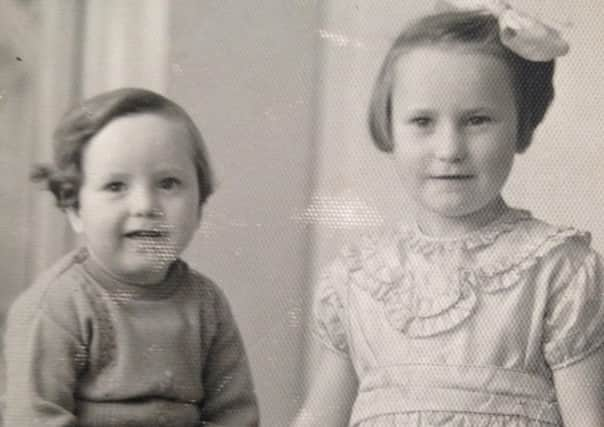

Esther Fyffe was eight years old and her brother Roy was four when their home came crumbling down around them on Easter Tuesday 1941.
The pair were in their Harcourt Drive home with their mother when the bombs began raining down over Belfast Their father, an RUC officer, was working the nightshift.
Advertisement
Hide AdAdvertisement
Hide AdEsther said: “I can remember we went to bed quite early, we were conscious of sirens going and the planes flying over. Then it was the case my mother realised she better get us out of bed. I can remember coming down the stairs and the stairs absolutely shaking as we came down.
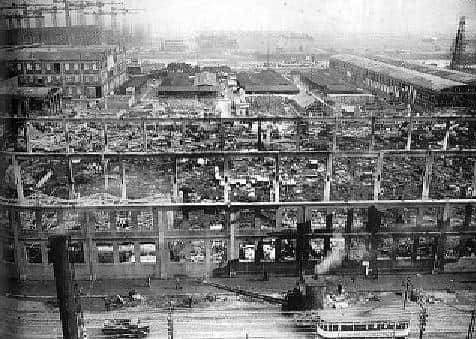

“We went under the stairs because there was no light under the stairs. Roy panicked, he was only four at the time, and my mother had to bring him out. We couldn’t stay under the stairs so then she brought the table out because that was another thing they were telling us to do. She brought the table out, we all sat under the table and she had Roy on her knee and was reading to us to keep us as calm as possible.
“Shortly after that the whole house seemed to shake and before too long the house just collapsed and we were in it.
“I managed myself to be able to get out and I shouted for my mum. She was buried under rubble and Roy was buried. He was actually blown off her knee and she didn’t know where he was but she could hear the wee cry.
Advertisement
Hide AdAdvertisement
Hide Ad“She was telling me to shout for help which I did. I don’t know whether it was an air raid warden but he had a helmet on I can remember, and I said ‘help my mummy’ and he came in and managed to get my mum out but she’d only half a dress because half of her dress was left under the rubble.”
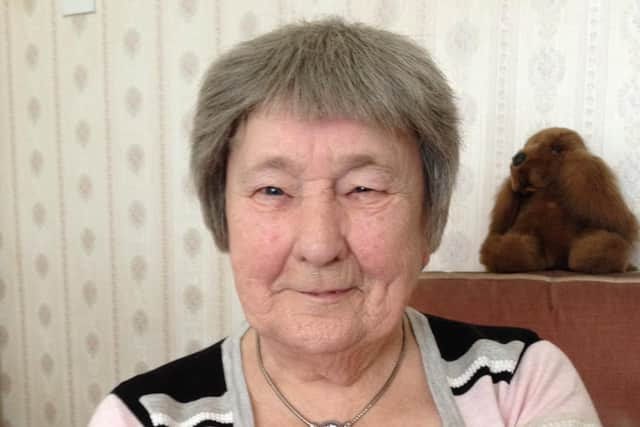

Esther said that after they got her brother out from the rubble they went out into the street: “The air raid wardens were shouting ‘drop’ because the planes were coming over, the flares were lighting the whole sky and we had to drop and my mother had to drop on top of me.
“The air raid warden was very good, he kept Roy in his arms. That’s the only thing that Roy can remember, he can remember the man putting him on the ground and lying on top of him because we couldn’t have any movement. My mother lay on top of me and the man who had Roy lay on top of him.”
Esther said they took refuge in a house further down the street before an ambulance took them to Jaffa School where they were looked after.
Advertisement
Hide AdAdvertisement
Hide AdShe said: “I think it was Red Cross or St John’s Ambulance and they were there giving out tea and drinks to everybody. We were sitting on top of the desks because the floor was wet, a pipe had burst or something, and we were there for a short space of time when the police came in and said we had to get out because a land mine was at the back of the school and hadn’t gone off.
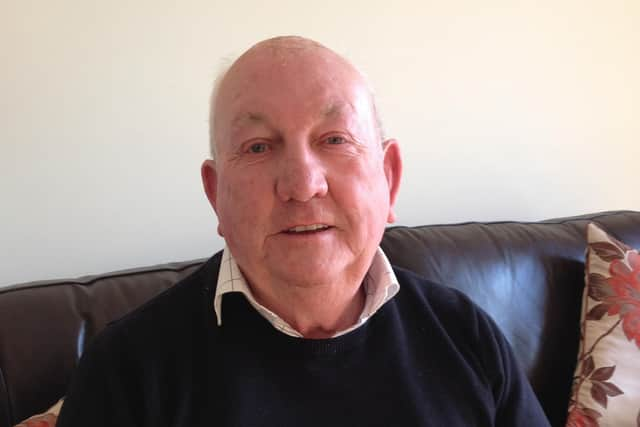

“The air raid warden I think went out onto the Cliftonville Road and stopped all the cars that were going up the road and asking them if they could take people up to the Girls Model School, so that’s where we ended up, we spent all night there.”
Amid the death and destruction Esther told of a moment of joy at the school: “We were just all sitting in the classrooms you know and then we noticed that there was a big screen came in and was put round a certain area and next thing there was the cries of a baby and didn’t the lady give birth.
“Afterwards my mother was saying she’d given birth to twins.”
Advertisement
Hide AdAdvertisement
Hide AdThen came an emotional reunion with her father: “My dad didn’t know where we were you see, he came home from duty, hadn’t a clue where we were.
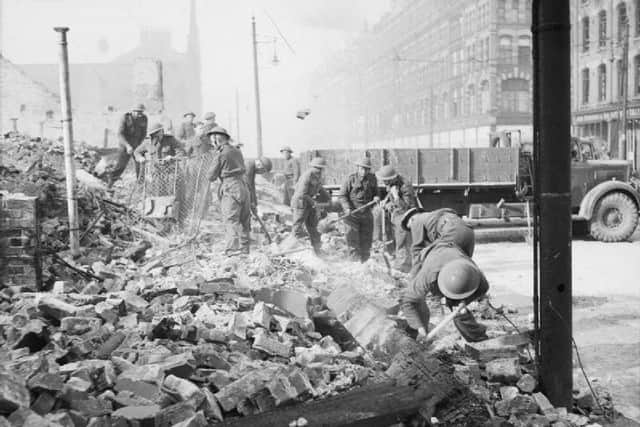

“He saw the house destroyed, didn’t know if we were buried underneath, whether we’d got out, but I suppose someone told him people were moved down to wherever. Then he came up and he’d gone round the different classes and then came across us. He was relieved at that. I think it was the first time I’d ever seen my dad cry.”
Of the aftermath Esther said: “We knew that we’d lost everything. I think the whole row of houses were gone.
“We could have got the house back again when they started building up again but my mother, when she saw them, she wasn’t interested in going back again because they were much smaller than what we’d left – you couldn’t have swung a cat, as they say, in them.”
Advertisement
Hide AdAdvertisement
Hide AdRecalling the moment she got out onto the street on the night of April 15, 1941, she said: “All I could see when I came out was almost like a mountain – the houses had all collapsed on top of each other and I could see wee figures coming down and movement, movement, but then the whole place was in darkness at that time, it was during the night you see and the only light that there was, was when the flares came.”
Finding safety in fields and watching explosions
Bertie Thompson recalls escaping to the fields for safety: “I remember the sirens going off, and my father saying ‘right, mon, we’re all going up to the farm’. “That was Graham’s farm, a quarter of a mile further up the road from where we lived (Ligoniel).”
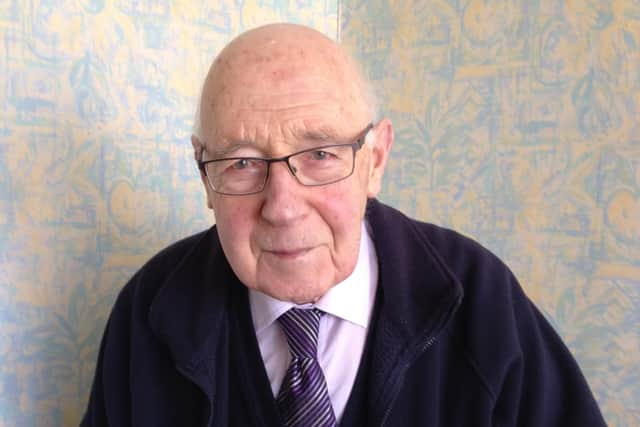

He said lots of people made their way to the farm, some on horse and cart. Bertie made the trip in his father’s Austin Ruby, which had a removable back seat.
Bertie said: “At the top grazing field, you looked down and you saw Belfast in the distance away below you. We were way high above the chimney tops of the factories. My father, he put the seat of the car down and we just sat on that. There were plenty of other people sitting there too.
Advertisement
Hide AdAdvertisement
Hide Ad“The sky lit up and searchlights were all going up, all over the sky, and then the explosions started. Looking down into Belfast it was a mass of flames, different parts of it, and you heard the explosions and you seen all the flashes of the buildings going.
“When that noise all started the horses start running round and round the field. There must have been about a dozen or more horses and they just kept running round the field.”
He added: “We heard the planes. You didn’t see them, but you seen the searchlights searching the sky for them.
“I was too young to be frightened then.”
I don’t remember being scared, thrilled would be more like it: Warden’s son
Advertisement
Hide AdAdvertisement
Hide AdDavid Gooding talked about his father’s role as chief air raid warden of Belfast as well as his own memories of air raids.
He said: “[My father] was working as chief warden. It was a matter of organising supplies, instructions on what to do and liaising with the other services, the rescue, the fire and so on.
“The government authorised the building of air raid shelters and shelter warden’s posts. These were built half on pavements and half on the roadway. There wasn’t much traffic in those days so it didn’t cause any great inconvenience. But they were dark and they were smelly and as it turned out, they weren’t all that safe.”
David described the shelter his father built at their home in Lismoyne Park off the Antrim Road in north Belfast: “[It had] a strengthened ceiling, the windows built up with brickwork, gas-proof, gas-tight screens over the doors, with spare candles in case the electricity went out, which it did.
Advertisement
Hide AdAdvertisement
Hide Ad“Upstairs the bath was filled with water again to give a temporary firefighting or for use if the water got cut off as it was.”
David commented: “I don’t remember being scared, thrilled would be more like it. I didn’t know what was coming next and I hadn’t thought of the consequences, it was just exciting to be there at the time it was happening.”
He described a close call during a firebomb raid: “The message came through just after midnight that there was a raid on the way, apparently it had been picked up by the radio scanners somewhere, probably in Wales, because the planes came up the Irish Sea from Brest, about two hundred of them.
“There were firebombs in the gardens either side of us and around here, but the centre of town got the worst of it.
Advertisement
Hide AdAdvertisement
Hide Ad“The house behind us got a firebomb between its chimney and the sloping roof and the wardens managed to deal with that one.
“Firebombs were about twelve to fifteen inches long, inch and a half diameter with a metal tail, made of stuff called thermite. If it fell on something strong enough to break the detonator, the fire would spread very quickly.”
House received direct hit from incendiary
Margaret Wilson recalled the night her house was hit by an incendiary bomb and how her grandfather refused to “move out of bed for Hitler”.
At the time of the Easter raid Margaret was living with her grandparents on McMaster Street off the Newtownards Road.
Advertisement
Hide AdAdvertisement
Hide AdShe said: “Our house got a direct hit from an incendiary bomb which wasn’t one of the explosive types of bomb but it set the house on fire.
“We were able to, with the help of the air raid wardens, put that out but the house was very badly damaged and it was after that, that my mother decided that I should be shipped off to the country for safety.
“That particular night, the city was in flames, the church at the top of our street was in flames. The sky was red, people were running, people were shouting, people were afraid. It was dreadful.
“You hear the sirens first, that’s your warning.
“I lived with my grandparents for my father was dead and my mother had to work and granny and grandpa wouldn’t get up.
Advertisement
Hide AdAdvertisement
Hide Ad“My grandfather said Hitler wasn’t going to move him out of his bed, and granny’s corsets were in the lower room so she didn’t want to come downstairs to get her corsets.
“In the meantime, my mother had got me up. I was 10 and I can’t remember feeling afraid, but my mother’s youngest brother also lived with us, he was only 11 or 12 years older than me and he’d just come in from the Scouts.
“He had his uniform on and whenever the incendiary bomb came through our attic roof it bounced onto his bed.
“Fortunately he wasn’t in it and then it burrowed itself through the floorboards.
Advertisement
Hide AdAdvertisement
Hide Ad“By then my mother had alerted the air raid wardens and the air raid wardens came in and they were equipped with stirrup pumps and buckets and all sorts of things, hoses, and they were able to bring the fire under control but the place was full of acrid smoke.
“I don’t remember feeling afraid, I honestly don’t remember feeling afraid, but I think children really didn’t realise just how serious the situation was.”
Bombs in Bangor
As well as Belfast, the Luftwaffe also bombed Bangor. Rita McClure who lived in Bangor and worked in Belfast witnessed the aftermath of both raids.
She remembers turning up to work in Castle Street on Easter Wednesday and finding her office building gone: “It was just a mass of rubble. And it was just unbelievable. We just couldn’t believe that there was just this big empty space.”
Advertisement
Hide AdAdvertisement
Hide AdShe remembered the air raid in her home town: “I understand they tried to bomb the pier in Bangor. The bomb missed the pier but it landed in the sea but even that had caused a lot of damage in Bangor main street and it had blown out the lovely windows in my church.
“There were quite a lot of shops demolished. That night, it must have been an awful blast because my step father had gone out to the garden gate and he was blown back into the house with the, you know, the noise of it. I remember that vividly.”
Eldest brother slept through air raid
Dr Sidney Lowry, 90, from Crawdfordsburn in Co Down writes: “There are three events that I recall from the time, when I was aged 10.
“In what must have been the first air raid of April 7 1941, we had for some reason moved to my grandmother’s house in 20 Cyprus Park, east Belfast. We all took shelter in the broom cupboard under the staircase. My eldest brother John continued to sleep and we could not get him out of bed.
Advertisement
Hide AdAdvertisement
Hide Ad“We could hear the exploding bombs and were scared, nay terrified. In those early days I collected newspapers and waste paper in an old pram from neighbours for the war effort.
“The second event was returning from Portrush, after the biggest raid of April 15 1941. We were perhaps returning to east Belfast on the Easter Tuesday morning itself. Looking back, it is interesting that during that difficult time we still had a car and were able to take a short weekend break.
“The motorway bypass of north Belfast had not then been built. As we drove down the Antrim Road we were shocked to see the burnt-out homes and smoking rubble. My younger brother Roger recalled that the lions had escaped from Bellevue Zoo.
“The following month the family evacuated’ to the Killyleagh area for safety reasons, where I witnessed the final air raids from afar, May 4 and May 5.
Advertisement
Hide AdAdvertisement
Hide Ad“In the blackout I had a clear vision of watching spellbound the brilliant glow and flashing lights 20 miles away in Belfast. We were in a cottage in Lisnaw, Clea Lake, in Co Down.
“One final memory was visiting our cousins, the Secker family, in 3 Knockdarragh Park near Stormont. An incendiary bomb had gone through their roof to the ground floor and the hole through three floors was evident for some time. They had a Morrison Shelter, which was basically a metal table-tennis table under which they crawled to safety.”
The Northern Ireland War Memorial kindly provided some of the oral accounts it has gathered from people relating to the Belfast Blitz.
The museum is recording how the people of NI were affected by the Second World War, and welcomes first or second hand accounts as well as photos, artefacts and letters.
Advertisement
Hide AdAdvertisement
Hide AdAnyone who would like to share their story can call Michael on 075 8863 4847 or email [email protected] for more information.
A message from the Editor:
Thank you for reading this story on our website. While I have your attention, I also have an important request to make of you.
With the coronavirus lockdown having a major impact on many of our advertisers - and consequently the revenue we receive - we are more reliant than ever on you taking out a digital subscription.
Subscribe to newsletter.co.uk and enjoy unlimited access to the best Northern Ireland and UK news and information online and on our app. With a digital subscription, you can read more than 5 articles, see fewer ads, enjoy faster load times, and get access to exclusive newsletters and content. Visit https://www.newsletter.co.uk/subscriptions now to sign up.
Advertisement
Hide AdAdvertisement
Hide AdOur journalism costs money and we rely on advertising, print and digital revenues to help to support them. By supporting us, we are able to support you in providing trusted, fact-checked content for this website.
Alistair Bushe
Editor